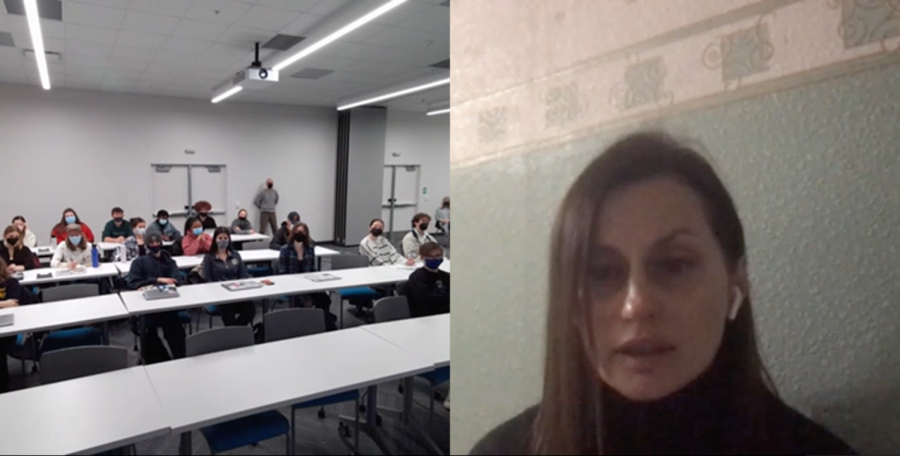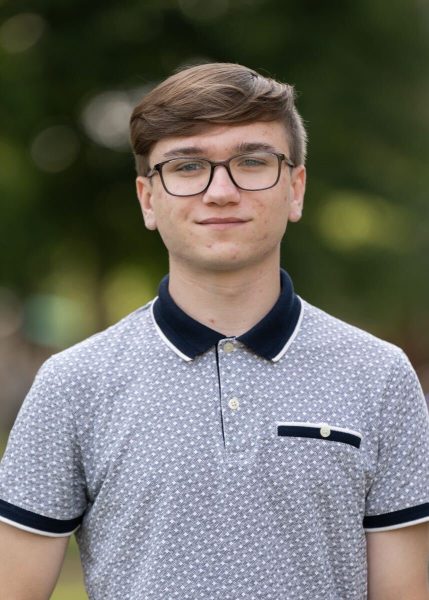Ukrainian journalist speaks to communication students after fleeing her home in Kyiv
Olesia Markovic, a journalist from Kyiv, Ukraine who has written for the Kyiv Post, Al Jazeera, CNN, BBC and Voice of America, speaks to Kent State students on March 1 from a friend’s house after fleeing Russian airstrikes in the capital.
March 2, 2022
Olesia Markovic is no stranger to conflict in Eastern Europe. As a journalist she has covered violence in Serbia, Kosovo, Chechnya and Transnistria, but she never expected to see war in her home country of Ukraine.
“On the 24th of February, we all woke up in a totally different reality,” Markovic said.
Speaking over a video call to dozens of students gathered in Stephanie Smith’s communication in a global society course at the College of Communication and Information, Markovic recalled the events of the past week, beginning at her home in Kyiv.
“My husband got a phone call from work and they told him the Russians were shelling Kyiv,” she said. “I could not believe that, but I heard the blasts.”
Those attacks are now a part of daily life for Markovic and Ukrainians across the country. With Russia firing an onslaught of rockets at Kyiv in the north, Kharkiv in the east and Podilsk in the south, the Ukrainian people have quickly adapted to living in a nation at war.
“Now I can tell by the sound if it is the Ukrainian defense system hitting the target because in this case, the sound is clinking sounds,” Markovic said. “Or something very big and dangerous is approaching and it’s going to be a blast.”
A day after shelling began in Kyiv, Markovic and her family, including her 8-year-old son, became refugees within their own borders. They fled the city center through what she describes as a long, exhausting journey to her mother’s home outside of Kyiv. Just days later, her family found themselves fleeing there too after a chemical plant in the town became a target for the Russian forces.
“In that small town, it doesn’t look safe for us at the moment,” she said.
Now staying at a friend’s house, her main priority is still the safety of her son.
“We guard him and shield him from all these negative effects. Of course, he is asking when he can go home, he badly wants to get to his normal life,” Markovic said, holding back tears. “Today he asked me for Belgian waffles with whipped cream and strawberries, and I said no. He was kind of upset, he couldn’t figure out why I said no.”
Children like hers have never known a peaceful Ukraine. Markovic drew comparisons between her son’s life now and hers during the Chernobyl nuclear disaster, when her mother would take her to the beach to distract her from what was happening.
“We do not have any living generation without trauma,” she said.
Despite this, Markovic has persevered and remained defiant in the face of war. As a journalist, she believes the media has a duty to counter Kremlin-sponsored propaganda designed to weaken Ukraine and Europe’s response to the Russian invasion.
“It’s not just a battle in the air, sea and land,” she said. “It’s also a battle of narratives, and narratives are important.”
A part of that battle is stopping the dissemination of false information on social media and in the news. On Feb. 27 the EU announced a ban on Russian-sponsored television stations RT and Sputnik, which have been accused of spreading propaganda. Journalists, Markovic said, must also play the role of archivists to prevent an ending like the Second Chechen War, where the Russian government managed to hide the reality of the war from international observers.
“Our job, yours, mine, the media and the international observers, is just to document what’s happening here every day,” she told the room of communication students. “This information, this evidence, will be very important, and I hope that Mr. Putin will land in The Hague [where] this information will be used against him.”
That is why Smith felt the importance in bringing Markovic’s story, and consequently all of Ukraine’s, to Kent State.
“Bear witness to even a portion of what you’ve heard, and you’ll do something powerful,” Smith told the students and faculty in attendance. “That is exactly what our friend has asked us to do, to not let the evidence die.”
Alton Northup is a senior reporter. Contact him at [email protected].










